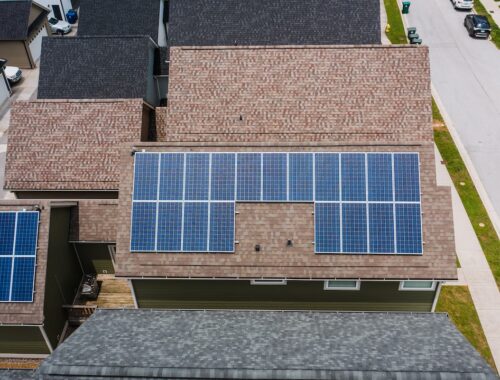
The Benefits of Solar Power for Homes and Businesses
Solar power has emerged as a game-changer in the energy sector, offering numerous benefits for both homes and businesses. With its ability to harness clean and renewable energy from the sun, solar power has gained significant popularity worldwide. In this article, we will explore the benefits of solar power and how it can positively impact homes and businesses.
Cost Savings:
One of the most significant advantages of solar power is the potential for cost savings. By generating electricity from solar panels, homeowners and businesses can significantly reduce or eliminate their reliance on grid-supplied electricity. This translates into lower monthly energy bills, providing long-term savings over the lifespan of the solar system, which can range from 25 to 30 years. Moreover, in regions where net metering is available, excess energy generated by the solar panels can be fed back into the grid, earning credits or monetary compensation from the utility company.
Return on Investment (ROI):
Investing in solar power systems for homes and businesses can yield a substantial return on investment. While the initial installation cost may seem significant, the long-term savings on electricity bills often outweigh the upfront expenses. As the cost of solar panels continues to decrease, the payback period for solar installations has significantly reduced, making solar power a financially viable option for many homeowners and businesses.
Environmental Benefits:
Solar power is a clean and renewable energy source, producing zero greenhouse gas emissions during electricity generation. By utilizing solar energy, homes and businesses can significantly reduce their carbon footprint and contribute to mitigating climate change. Unlike fossil fuels, solar power does not produce harmful pollutants that contribute to air pollution and respiratory illnesses. Embracing solar power helps create a sustainable future and preserves the environment for future generations.
Energy Independence and Security:
Solar power provides homes and businesses with a level of energy independence and security. By generating their own electricity, they become less reliant on the grid and vulnerable to power outages or fluctuations in energy prices. This is particularly advantageous for businesses that require a constant and reliable energy supply to operate. In addition, during grid outages, homes and businesses equipped with battery storage systems can continue to power essential appliances and maintain basic operations.
Long Lifespan and Low Maintenance:
Solar panels have a long lifespan, typically ranging from 25 to 30 years, with many manufacturers offering warranties to support their durability. Once installed, solar power systems require minimal maintenance. Routine cleaning to remove dirt or debris and occasional inspections to ensure proper functioning are usually sufficient to keep the system running optimally. With no moving parts, the risk of mechanical failure is significantly reduced, further enhancing the reliability of solar power systems.
Government Incentives and Tax Benefits:
Many governments around the world offer incentives and tax benefits to promote the adoption of solar power. These incentives can include grants, tax credits, rebates, or feed-in tariffs, making solar installations more affordable for homeowners and businesses. By taking advantage of these incentives, the overall cost of installing solar power systems can be significantly reduced, accelerating the return on investment.

Increased Property Value:
Solar power installations can increase the value of both residential and commercial properties. Studies have shown that homes and businesses equipped with solar panels tend to sell at a premium compared to those without solar systems. The presence of solar power not only attracts environmentally conscious buyers but also indicates reduced energy costs, making the property more appealing and financially advantageous.
Job Creation and Economic Growth:
The widespread adoption of solar power has contributed to the creation of new jobs and economic growth. As the solar industry continues to expand, there is a growing demand for skilled professionals in installation, maintenance, and manufacturing. Solar power installations stimulate local economies, attract investments, and foster innovation, further supporting sustainable development.
Durability and Reliability: Solar panels are designed to withstand various weather conditions, including rain, snow, and high winds. They are built with durable materials and undergo rigorous testing to ensure their longevity and performance. With proper installation and maintenance, solar panels can reliably generate electricity for decades.
Scalability: Solar power systems can be easily scaled up or down based on energy needs. Additional panels can be added to increase the electricity generation capacity, making it a flexible solution for homes and businesses with changing energy demands.
Energy Efficiency: Solar power systems operate on a direct current (DC) basis, which is more efficient than the alternating current (AC) used in the grid. By generating electricity onsite, solar power minimizes transmission and distribution losses that occur in traditional power systems.
Peak Demand Management: Solar power is particularly beneficial for businesses that experience high electricity demand during peak hours. By generating electricity during these peak periods, solar power helps reduce strain on the grid and minimizes the need for expensive additional power generation infrastructure.
Noise Reduction: Unlike traditional electricity generation methods such as generators or fossil fuel power plants, solar power systems operate silently. This is advantageous for residential areas or businesses that prioritize noise reduction and a peaceful environment.
Educational and Awareness Opportunities: Installing solar power systems provides educational opportunities for homeowners, businesses, and communities. It raises awareness about renewable energy, encourages sustainable practices, and inspires others to adopt clean energy solutions.
Disaster Resilience: Solar power systems with battery storage can provide a reliable source of electricity during natural disasters or grid outages. This is particularly important for emergency services, critical infrastructure, and areas prone to power disruptions.
Corporate Social Responsibility: Embracing solar power demonstrates a commitment to sustainability and corporate social responsibility. It enhances a business’s reputation and can attract environmentally conscious customers, partners, and investors.
Reduced Transmission and Distribution Infrastructure Costs: Solar power reduces the strain on the electricity grid, alleviating the need for extensive transmission and distribution infrastructure. This can lead to cost savings for utilities and, in turn, potentially lower electricity rates for all consumers.
Health Benefits: Solar power significantly reduces the dependence on fossil fuel-based power plants, which are major sources of air pollution and contribute to various health issues. By adopting solar energy, communities can enjoy cleaner air and improved respiratory health.
Energy Diversity and Security: Incorporating solar power into the energy mix diversifies the sources of electricity, reducing reliance on finite and imported fossil fuels. This enhances energy security and reduces vulnerability to price fluctuations and geopolitical tensions associated with fossil fuel dependency.
Technological Innovation and Research: The growing demand for solar power has stimulated research and development in the field, leading to technological advancements, increased efficiency, and cost reductions. This continuous innovation benefits the entire renewable energy sector and accelerates the transition to a sustainable energy future.
Solar power offers a wide range of benefits for both homes and businesses, including cost savings, environmental advantages, energy independence, and resilience. By harnessing the power of the sun, individuals and organizations can contribute to a cleaner and more sustainable energy landscape while reaping the financial and societal rewards of solar energy.
You May Also Like

Solar Power in Agriculture: Benefits for Farmers and Food Production
September 12, 2023
Solar Power and Job Creation: Opportunities in the Renewable Energy Sector
July 3, 2023

